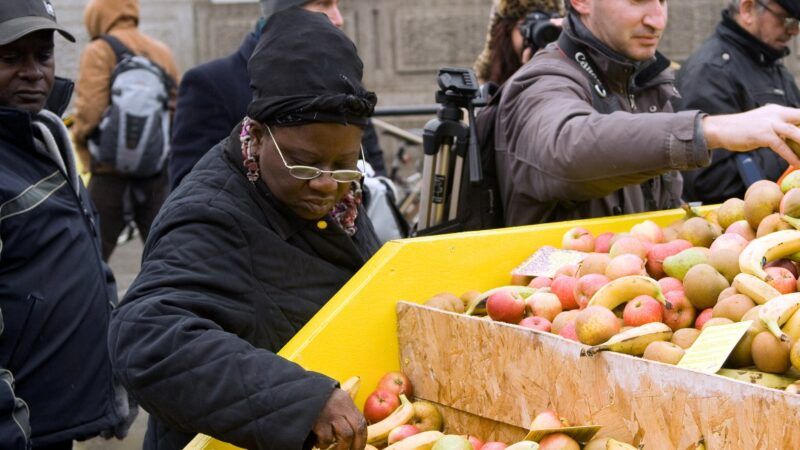Local Governments Play Scrooge To Stop People from Helping the Needy
Do you have a license for that refrigerator stocked with free food?

It wouldn't truly be the Christmas season here at Reason without a report about officials trying to shut down a project to help the needy. This year's tale comes from Roslindale, a suburb of Boston.
There, as the coronavirus pandemic played out, residents looked for ways to help the needy in their neighborhood. A group of volunteers started putting together a community food pantry, salvaging groceries from local stores before they'd be tossed out as waste. A local therapist agreed to host the group's fridge and freezer in her backyard. The group was serving more than 50 people every Friday.
Then local officials came calling. The Boston Inspectional Services Department warned the volunteers that they were operating an "illegal food pantry" and that they could, if they continued, face $1,000 fines and a year in prison.
The department insisted this was all about safety. Officials told The Boston Globe that they were happy to "work with the organizers of this operation to make sure the food being offered is safe for recipients." But that's what they said after the newspaper contacted them. The therapist, Rachel Stanton, told the paper she had asked the authorities for help to bring the pantry up to snuff, but they seemed mostly interested in shutting her down. That's not how officials behave if they a mutual aid project to continue. It is how they behave if some of Stanton's neighbors have been complaining.
The volunteers moved the pantry to a nearby elementary school, in hopes that this would satisfy the government. And now that the group has gone to the press, the authorities seem to be a bit more conciliatory. But it's telling that even when an epidemic has stretched government services to the limit, officials' first instinct was to try to shut down what they can't control.
These tiny food pantries are on the rise across the country, being a simple, easy way to help people. Roslindale isn't the only place where they've run into trouble. Earlier this year, a woman who launched one in Washington state was shut down and threatened with fines. (She then filed a lawsuit with the assistance of the Institute for Justice.) Other pantries have been shut down in California and Pennsylvania. Officials usually justify these crackdowns by citing health concerns, but when you look deeper you usually find that the underlying problem is people who either think the pantries are eyesores or don't like it when the needy congregate.
Bonues video: In 2012, ReasonTV showed how the mayor of Philadelphia tried to stop charities from feeding the homeless in public parks:


Show Comments (33)